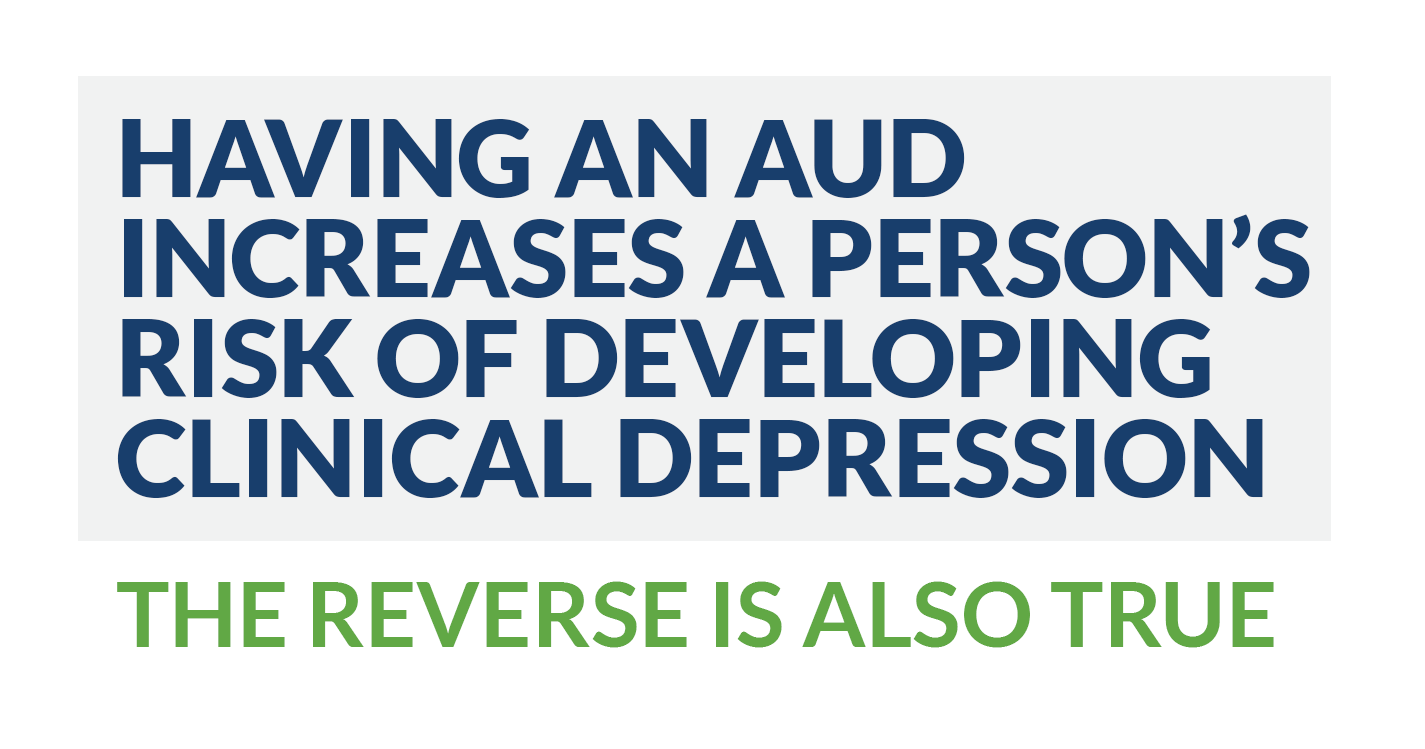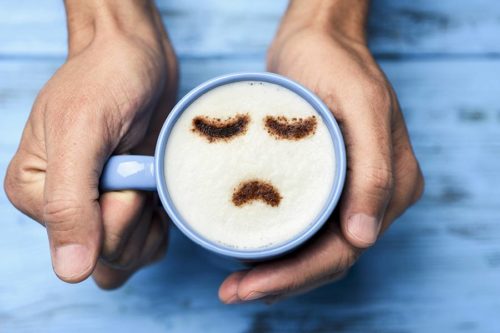The Connection Between Alcohol and Depression
Alcohol is undeniably America’s favorite legal poison— socially prevalent, highly profitable and extremely addictive. In combination, alcohol’s popularity and toxicity have devastating effects. The drug’s easy accessibility encourages abuse by adults and physically and psychologically vulnerable adolescents, while its social acceptability obscures its dangers and inappropriately de-stigmatizes excessive consumption.
Unbeknownst to many people, there is an inextricable link between alcohol and depression. Approximately one third to one half of people with alcohol use disorder (AUD) also suffer from depression. In response to major life stressors, unresolved traumas, self-esteem issues, social anxieties and a variety of other triggers, they turn to alcohol as a coping mechanism. Unfortunately, what usually begins as a benign attempt to escape from pain, anxiety and depression—or simply fit in socially— becomes a life and health-altering addiction with potentially deadly consequences.
STATISTICAL OVERVIEW
Acco
- The Centers for Disease Control and Prevention (CDC) reports that 38 million people binge drink at least four times per month, with approximately 6 dying daily from alcohol poisoning. The CDC further reports that, on average, 40 percent of college students admit to regular binge drinking.
- The Substance Abuse and Mental Health Services Administration (SAMHSA) reports that in approximately 30 percent of deaths by suicide in the US, blood alcohol levels (BALs) met or exceeded the legal limit.
- Approximately 30 to 50 percent of people struggling with AUDs simultaneously suffer from depression, and, according to the American Psychological Association (APA), alcohol abuse worsens pre-existing depression while creating new physical, cognitive and social deficits.
- Alcohol-related car crashes, DUI arrests and insurance claims cost Americans billions of dollars annually—creating an unparalleled social and economic burden. The loss of productivity in the workplace and destructive effect on the family unit are so extreme that exact figures are not quantifiable.
DO YOU DRINK WHEN DEPRESSED?
There are a multitude of reasons why people drink when they are depressed. Perhaps personal and professional stressors are accumulating, and the burden seems insurmountable. Perhaps unresolved traumas or social anxieties are creating a negative feedback loop that is driving you into an unhealthy pattern of avoidance and isolation. Maybe your marriage or relationship is strained or recently ended and you are haunted by low self-esteem, hopelessness and boredom with the monotony of life. If you are like many Americans, you may find the fast-paced, technologically saturated and professionally demanding lifestyle overwhelming.
You may be working excessively to pay the bills or unemployed, and struggling with the absence of love in your life. Assuming you are in a functional relationship, you may be grappling with underlying issues that prevent you from enjoying the intimacy, happiness and fulfillment you feel you deserve with your partner. You may be suffering from a painful or debilitating medical condition or disease for which there is little hope of a cure.
If one, or several, of these precipitating factors is true for you, the temptation to “drink away your problems” will exponentially increase over time. In fact, it is not uncommon for people to gradually transition from inner discontentment accompanied by occasional binge drinking to outer depression accompanied by full-blown alcoholism. Whatever the underlying cause, the relationship between drinking and depression is irrefutable and scientifically established.
If you are one of millions of Americans who feels a compulsive need to drink when depressed, you may also notice the following signs creating an overarching pattern in your life:
- Social isolation and professional discontentment
- Increasing feelings of apathy, boredom and unresolved anger
- Conflictual or habitually dissatisfying relationships
- Increasingly low self-esteem or self-hatred
- Unhealed or unaddressed psychological and emotional trauma
- General dissatisfaction with the quality and meaning of life
- Low or non-existent motivation to self-improve
- A disdain for others trying to help or even understand you
- Suicidal ideation or an unshakable sense of hopelessness
CAN ALCOHOL INDUCE DEPRESSION?

Previously, alcohol was touted as being beneficial when consumed in mild to moderate quantities; however, emerging evidence suggests that no amount of alcohol is safe for human consumption. Alcohol is not a harmless, recreational beverage that conveniently takes the edge off of life’s problems and alleviates personal concerns— it is a mind-altering poison that impairs judgment, overrides logic and progressively destroys physical and psychological well-being.
Alcohol’s depressant effect works through a distinct neurochemical mechanism. By artificially altering dopamine and serotonin levels—major neurotransmitters in the brain responsible for regulating sensations of pleasure and pain—it produces an almost immediate “feel good” sensation. These neurotransmitters are also located throughout the central nervous system (CNS), which helps explain alcohol’s fast-acting euphoria. Generally, the effects of alcohol can be felt within 10 minutes of entering the body, and the greater the quantity consumed, the more heightened the initial euphoria becomes. As blood alcohol content (BAC) rises, cognitive and physical functioning become progressively impaired, inevitably resulting in a crash.
The human body is not designed to handle the short or long-term effects associated with artificially manipulating major neurotransmitters and other delicate components of the neurological system. Even in people who have developed extraordinary tolerance to alcohol over time, the destructive effects on cognitive and physical functioning and health are indisputable.
Nowhere is this destruction more apparent than in the various mood disorders alcohol use induces, or at the very least exacerbates. Although depression is a known genetic tendency in certain people, there are definite environmental, dietary and personal triggers. Extensive alcohol use has been linked to the following, clinically significant varieties of depression as well as a host of anxiety and personality disorders:
- Major depressive disorder – a type of severe depression in which sufferers experience debilitating symptoms that interfere with their ability to function normally. It may appear as an isolated episode, but most sufferers have multiple episodes throughout their lives.
- Psychotic depression – a type of depression in which sufferers experience severe symptoms accompanied by psychosis. Hallucinations may be of an audio or visual variety, or limited to having false beliefs and delusions.
- Persistent depressive disorder—a depressed mood lasting for two years or more. In certain cases, it is a lifelong condition.
- Seasonal affective disorder – a variety of depression that usually begins in the late-fall and early winter months as sunlight decreases and the body produces less vitamin D. It can be alleviated by exposure to sunlight or even artificial light, but not when excessive drinking prevents the body from metabolizing necessary vitamins.
- Bipolar disorder – a serious disorder in which sufferers vacillate between episodes of depression and mania— a state characterized by exaggerated moods and super-charged energy.
DOES ABSTINENCE HELP DEPRESSION?
Abstaining from alcohol use is associated with increased productivity, improved self-esteem, happier relationships and a heathier, functional lifestyle— all of which help alleviate depression. Beyond these outwardly obvious benefits, abstinence allows the body a chance to recuperate from the damage inflicted upon it by excessive alcohol consumption. Abstinence helps the body to reestablish equilibrium, chemically recalibrate and function at optimal capacity, assuming there isn’t extensive, irreversible damage. Even in cases where severe damage results from lifelong alcoholism, such as Wernicke-Korsakoff Syndrome (WKS), a progressive neurological disorder, abstinence is proven to help slow the progression of the disease and, in certain cases, reverse some of the undesirable effects.
Although early recovery can be a particularly depressing time, as illusions are dispelled and intoxication-based pillars of support removed from someone’s life, the first weeks and months after getting sober can also be inwardly liberating and refreshingly challenging. Many alcoholics struggling with depression find relief with continued commitment to recovery and eventually experience a reduced or even eliminated desire to use. Among the approximately 40 percent of people in recovery suffering from clinically significant depression, a significantly lower percentage is associated with long-term sobriety.
TREATING ALCOHOLISM AND DEPRESSION
Alcoholism and depression are debilitating disorders that require immediate professional help in order to be successfully treated. If you, or someone you love, are struggling with both, it is imperative that you contact a substance use professional today.
Depending upon your individual diagnosis and overall condition, intensive inpatient treatment in a medically supervised detox is an appropriate first step. In such an environment, a team of licensed, highly qualified doctors, healthcare professionals and therapists can utilize their knowledge and skills to help you create an individualized treatment and aftercare plan. They will implement medication-assisted treatment (MAT) to help reduce the severity of alcohol withdrawal while simultaneously providing behavioral therapy and treating co-occurring disorders such as depression.
Regardless of whether the depression or alcohol abuse came first, inpatient treatment offers a comprehensive box of tools to help rebuild the life of anyone willing to face reality and put forth maximum effort. Like all addiction, alcoholism is a chronic, relapsing disease, and long-term recovery outcomes improve dramatically with aggressive, early intervention. The very same applies to depression. Never delay seeking treatment, and always remember: tomorrow you may not get the chance to do what you could have done today.
For more about alcohol addiction, depression and recovery, check out these related articles:
- How Treatment for Co-Occurring Disorders Improves Recovery Outcomes
- The Legal High: Why Alcohol is so Addictive
- Common Co-Occurring Disorders Associated with Addiction
- Can Previous Addicts Drink Responsibly After Rehab?
Sources:
The British Journal of Psychiatry. Alcohol use disorders and the course of depressive and anxiety disorders. June, 2012.
Clinical Psychology Review. The relationship between anxiety disorders: A review of major perspectives and findings. March, 2000.
Addiction Research and Theory. Social anxiety and alcohol use: The role of alcohol expectancies about social outcomes. July, 2014.
Journal of the American Medical Association (JAMA). Role of Self-medication in the Development of Comorbid Anxiety and Substance Use Disorders. Aug, 2011.

